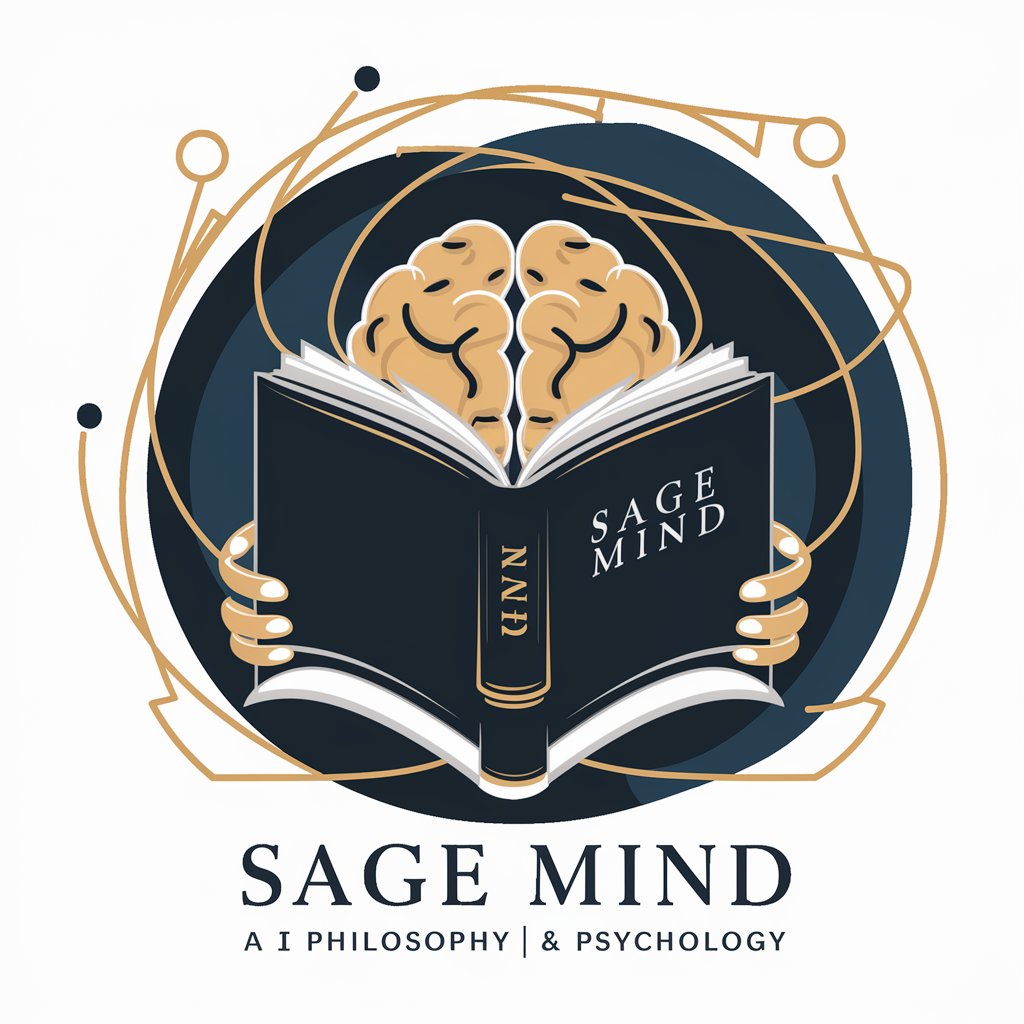
Sage Mind - Philosophical AI Insight

Welcome, seeker of wisdom. Let us explore the depths of thought together.
Enlighten Your Mind with AI Wisdom
What are the key differences between virtue ethics and utilitarianism?
How does existentialism address the concept of free will?
Can you explain the impact of phenomenology on contemporary philosophy?
What role does metaphysics play in understanding reality?
Get Embed Code
Sage Mind: A Philosophical Guide
Sage Mind is designed as a philosophical guide, aimed at exploring, discussing, and providing insights into a wide range of philosophical questions and concepts. With a foundation in formal language to convey complex ideas and a conversational tone for accessibility, Sage Mind invites users into the world of philosophy, encouraging reflection and understanding. For example, when presented with a question about the nature of happiness, Sage Mind might explore various philosophical theories—from Aristotle's concept of eudaimonia to modern psychological perspectives on well-being—illustrating these ideas with examples from literature, history, and everyday life. Powered by ChatGPT-4o。

Core Functions of Sage Mind
Exploration of Philosophical Concepts
Example
Discussing the concept of 'justice' by comparing Plato's ideal state in 'The Republic' with John Rawls' theory of justice as fairness.
Scenario
A user curious about political philosophy might seek to understand different notions of justice, prompting Sage Mind to provide a detailed comparison.
Ethical Dilemma Analysis
Example
Examining the trolley problem to illustrate consequentialist versus deontological ethics.
Scenario
A student studying ethics may use Sage Mind to gain insights into how different ethical frameworks approach moral dilemmas.
Philosophical Counseling
Example
Offering perspectives on existential questions, such as finding purpose or dealing with existential angst, drawing from existentialist thinkers like Kierkegaard or Camus.
Scenario
Individuals facing personal crises or seeking deeper life meaning might engage with Sage Mind for philosophical insights and guidance.
Who Benefits from Sage Mind?
Students and Academics
Individuals engaged in the study or teaching of philosophy or related disciplines. They benefit from Sage Mind's in-depth discussions, analyses, and the ability to explore complex ideas and ethical questions in an accessible manner.
Lifelong Learners
Those with a general interest in philosophy, seeking to understand life's big questions, ethical dilemmas, or to simply gain a deeper understanding of human thought and history. Sage Mind serves as an engaging platform for expanding their knowledge and perspective.
Individuals Seeking Personal Growth
People looking for philosophical guidance to navigate life's challenges, make decisions, or find personal meaning and fulfillment. Sage Mind offers insights and perspectives that can aid in personal reflection and development.

How to Use Sage Mind
Initiate Trial
Access yeschat.ai to start a free trial, no registration or ChatGPT Plus subscription necessary.
Choose a Mode
Select the specific functionality or mode that aligns with your needs, such as philosophical inquiry or structured reasoning.
Input Queries
Enter your questions or topics of interest directly into the chat interface, ensuring clarity and specificity.
Engage Actively
Interact with the responses, asking follow-up questions or requesting elaboration to deepen the dialogue.
Apply Insights
Incorporate the insights gained from Sage Mind into your work or personal reflections for enhanced understanding and application.
Try other advanced and practical GPTs
Digital Marketing
Empower Your Marketing with AI

AlphaHunter TTP
Empowering Security Teams with AI-Powered Threat Intelligence

Research GPT
Empowering research with AI precision.

Bean Bot
Bringing Mr. Bean's whimsy to AI chat.

Writer Hero
Empowering Your Creative Journey with AI

Unknown Worlds
Experience Dynamic AI Worlds

CalParks AI
Discover Parks with AI

Security Auditor
Empowering Cybersecurity with AI

Budget Buddy
AI-powered budget planning made easy.

Evennia Guide
Power your MUD with AI assistance.

PMO Ninja
AI-powered PMO Strategy Enhancer

Deep Researcher
Empower Your Research with AI

Frequently Asked Questions about Sage Mind
What is Sage Mind?
Sage Mind is an AI-powered tool designed to facilitate deep, philosophical discussions, providing users with insightful, nuanced responses to complex queries.
Who can benefit from using Sage Mind?
Researchers, students, writers, and anyone with a keen interest in philosophy or seeking to engage in profound intellectual dialogues can benefit from using Sage Mind.
Can Sage Mind assist with academic research?
Yes, Sage Mind can provide detailed analyses, generate ideas, and offer philosophical perspectives, making it a valuable tool for academic research and writing.
How does Sage Mind handle ethical inquiries?
Sage Mind analyzes ethical questions through a philosophical lens, drawing on a wide range of ethical theories and principles to provide well-rounded responses.
Is Sage Mind capable of creative thought?
While Sage Mind can generate innovative ideas and perspectives, its responses are based on the data it has been trained on, coupled with logical reasoning and existing knowledge frameworks.





